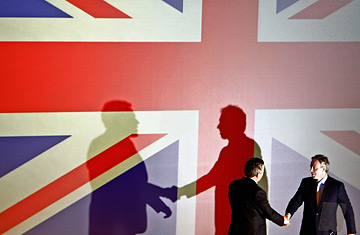
Gordon Brown shakes hands with Tony Blair after being confirmed as the new party leader on June 24, 2007.
Folk wisdom holds that a change is as good as a rest. But as one Prime Minister departs and another takes office in Britain, a merciless salvo of changes is leaving some folk in Westminster praying for a rest. Civil servants have found themselves scurrying at cartoon speeds to keep the government ticking over, while politicians are distracted by concerns over the future — their own and the country's.
Britain's political landscape is being transformed, its personnel, style and structures thoroughly revamped. Its two biggest beasts are changing their spots. Gordon Brown promises to be more open and relaxed than in his incarnation as the brilliant but grumpy Chancellor of the Exchequer. Rumors that Tony Blair will soon announce his conversion to Catholicism continue despite a difficult meeting with the Pope on the weekend. But what might any personal metamorphoses mean for the world? How will Prime Minister Brown deliver the change that has already emerged as the theme and buzzword of his premiership, cropping up 30 times in a speech on Sunday as he formally took the helm of the Labour Party? And into which globe-changing initiatives will his predecessor channel the energies and skills that have done so much to change Britain since he took office 10 years ago?
One woman gets a preview of their plans tomorrow, but she won't be sharing them with the British public. Queen Elizabeth will receive Tony Blair in a private audience at Buckingham Palace early in the afternoon to accept his resignation. The prime ministerial limousine that brings Blair and his wife Cherie from Downing Street will not take them on to their next destination but instead must remain parked up in the palace courtyard, awaiting a new master. He won't be long in coming. Brown, too, will meet the Queen, after his predecessor is safely off the premises in a private car, to accept her request to form a new government.
In a startling departure from British political traditions, Brown's government promises to include ministers from outside Labour's ranks. Lord Ashdown, a Liberal Democrat and former leader of his party who went on to serve as High Representative for Bosnia and Herzegovina, revealed last week that he had turned down an approach to join Brown's new-look cabinet. Other candidates may have accepted. Brown told the BBC he was also hoping to "draw on some of the talents of our society who are not normally associated with party political events and forces." He'll unveil the lineup of his new government before the end of the week.
Britons will watch all such appointments closely for hints on Brown's health and education policies and on how he may tackle the hottest topic in domestic politics: how to solve the shortage of affordable housing. The international community will focus instead on big issues such as the duration of Britain's presence in Iraq and his handling of relations with America and the E.U.
In an interview with TIME last month, Brown spoke of his hopes that America and Europe might work more closely "despite all the difficulties of the last few years... to make sure the world is actually not just a more economically prosperous place but a fairer place." Those sentiments are straight from the Blair handbook — which is one reason that Blair threatens to cast a long shadow over Brown's foreign policy.
The departing premier promises he won't offer unwanted advice to his successor. Blair's friends aver that he'll also refrain from criticizing or passing comment on Brown, despite the bitterness engendered by their ruptured friendship and long rivalry. But Blair is unlikely to opt for a quiet retirement. On Tuesday, after assent came from Moscow, Blair was cleared to be appointed to the role of Middle East peace envoy for the quartet of the U.S., E.U., U.N. and Russia in the quest for peace between the Israelis and the Palestinians. Blair also hopes to launch an inter-faith initiative, discussed in Saturday's meeting with the Pope. The web address www.blairfoundation.org.uk was registered last November.
This morning Blair held his last press conference in Downing Street, sharing the stage with the Governor of California. Arnold Schwarzenegger had come to discuss climate change and expressed his desire to see the man he praised for his "great leadership and great friendship" put his skills to work for the benefit of the global environment. Blair refused to be drawn on his plans for the future, and prepared to leave the podium, returning only for one last quip. "My press officer said whatever else you say today, don't say 'I'll be back,'" he remarked to laughter and a round of spontaneous applause.
